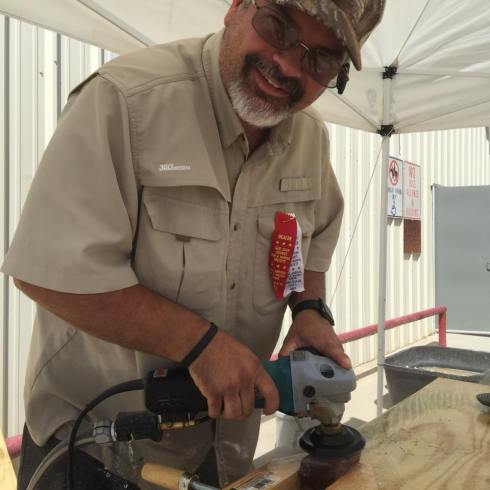
My family is a rockhounding family. Everywhere we go, we plan to look for rocks of all types. Four years ago, I didn’t know what most of them are, beyond quartz, but now I have a much greater level of knowledge through involvement with our local gem and mineral club. This has been a great tool to help our family go from picking up any and every rock to being selective with what we keep. At least it helps the pile in my yard get bigger more slowly.
This past year, I have spent time learning how to polish rocks using a wet grinder and some polishing pads I bought at our club’s gem and mineral show last year. I’ve learned how to shape rocks and put a beautiful polish on them that brings out their true character and beauty.
This weekend is our annual gem and mineral show, and it has been my pleasure to be the one doing rock polishing demonstrations. I’ve been able to meet many people and polish rocks for customers and vendors alike! It’s hard to believe that four years ago, my family didn’t know beans about rocks.
When I polish a rock, I want to expose what’s underneath, so that the true beauty of the rock can be shown. The finished product will shine and turn a ho-hum rock into something of value. Often, however, I must shape a rock to get it to where it will accept a polish. To do this, I have to use the grinding wheel. The grinding wheel takes off the jagged, rough parts that do not allow for polishing. It removes the uneven surfaces to present a face more acceptable to the upcoming transformation. But the grinding wheel doesn’t polish. In fact, the end result after the grinding wheel leaves a surface full of scratches and scars that must be sanded away.
After the surface is level or nearly so, and polishing can begin, I start with a 50 grit sandpaper to get rid of the scratches made by the grinding wheel and finish shaping the surface. After this wheel, I progress through a set of wheels until I finish with a 3000 grit diamond wheel. I could go further to higher grit, but I don’t currently have the tools to do so. For my purposes, 3000 grit is fine.
After the grinding wheel, each of the polishing grits must be used with water. Water is the lubricant that keeps the rock from overheating and fracturing from the friction of the pad.
Why tell you all this? Because I sometimes feel like that rock. God wants to reveal his purposes in me and transform me back into the person he intended when he created me, but I’m so stubborn, and I’ve done things that have created rough edges and deep gouges and a self that looks much different than the masterpiece God sees in me.
So he works to remove all those things that hide his masterpiece. Sometimes his ways are tough to handle. I can’t imagine what a rock would feel at the grinding wheel if it had feelings, but I know how I feel when a rigid part of me gets demolished by a circumstance God allowed me to endure. Sometimes he is putting finishing touches on an area in my life, and his ways are sweet to my soul because I welcome the change.
But all of that change begins with water. Baptism is like the lubricant that begins the process of transformation, and celebration of the Lord’s Supper continues that lubrication for our souls as we renew our covenant with God each time we partake.
How’s your life? Are you still a ho-hum rock? Or are you allowing God to work in you to reveal the masterpiece he created in your mother’s womb?
